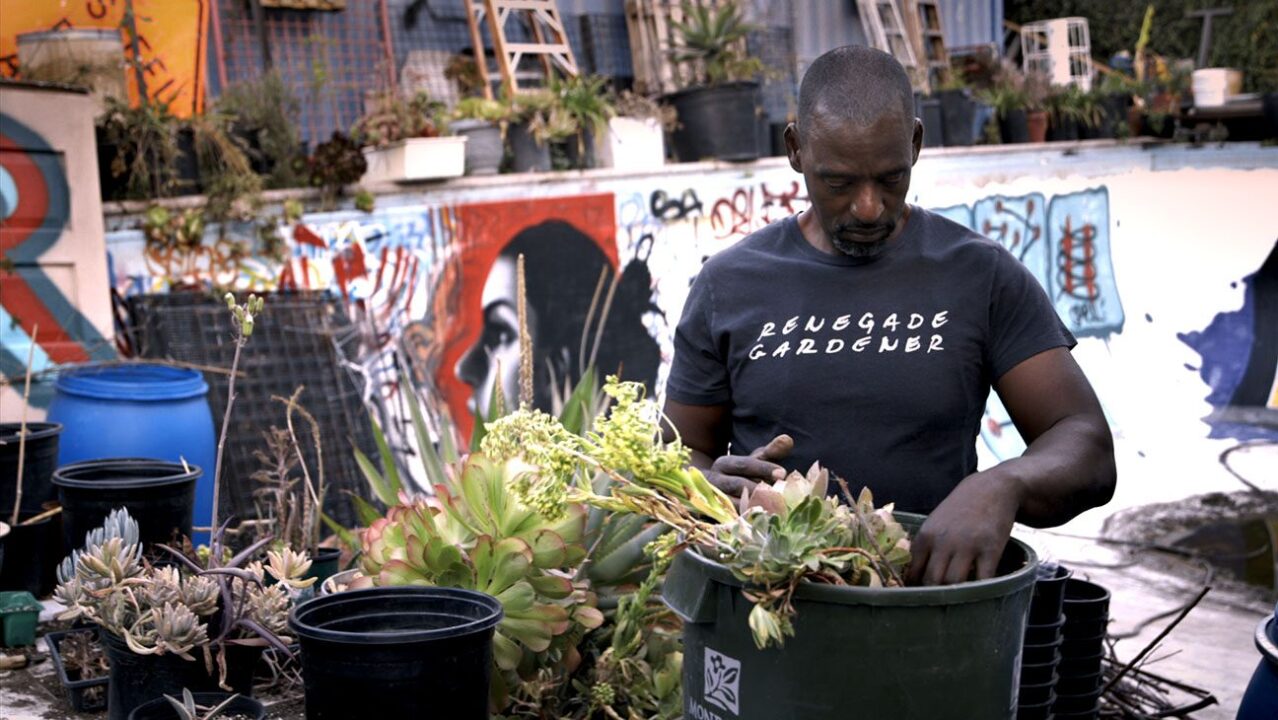Right off the bat, this is exactly the type of story that a documentary can portray so much better than any other medium. Within Southern L.A. are numerous underprivileged communities most of which are stuck in a cycle of poverty and criminal activity. Delila Vallot’s documentary debut, Can You Dig This, which fittingly premiered at the L.A. film festival earlier this year, is a counter argument to the negative stigma surrounding impoverished areas, displaying the potential growth that this community can have.
A large handful of protagonists is shown here, giving a great variety of ages and backgrounds and relationships with the garden. No character is short on emotionally connecting stories, which makes the entire film flow extremely well without any flack. The running theme is that many of the people in these urban gardens have backgrounds in gang or criminal behavior, as well as non-existent access to healthy food. Gardening is a radical statement far against the status quo of what’s expected. One gardener, Ron Finley, has become the most famous of the group for inspiring urban gardening nationwide. His poignant statements of wisdom ground the film, including his observation that within his neighborhood in Compton there are 3 grocery stores, and over 75 fast food restaurants. Finley says, “Some people call these food deserts. I call these food prisons because you can grow stuff in a desert.” Yet when we meet him, the city is trying to fine him for growing sidewalk gardens where it’s supposed to be plain grass. As he points out, grass takes double the amount of water and doesn’t produce food.
So often these communities become the subject of frustration and scrutiny when in fact there are stories of inspiration blooming within.
The other four characters each have their own level of heart and spirit compellingly documented. Quimonie is a girl under the age of 10 with an already blooming garden, which she started to help her family. This little girl, along with her 4 younger sisters, has so much heart and humor perfectly captured in the project; her close relationship with her father ends up being one of the most heart-warming elements of the film. Vallot sneaks in some character moments that allow us to truly love watching her on screen.
On the other end of the age spectrum is Hosea, an ex-convict who served in prison for nearly half his life and is now in a halfway house. Together with another ex-con named Henry, these two men, both over 70 and with a major chunk of their life behind bars, revitalize a space in their house and transform it into a garden. Seeing these old-timers, who would be considered criminals, connect with the earth in such a harmonious way, quietly displays an alternative to the abuse that our criminal system generates. The other two protagonists, Spicy and Kenya, also have stories equally as rich, compiling into a perfect display of five unique types of gardeners.
So often these communities become the subject of frustration and scrutiny when in fact there are stories of inspiration blooming within. The film’s director never establishes how involved they are with the characters, one of the film’s only weaknesses, but masterfully shows a full range of dynamic characters whose stories naturally progress over the runtime. But what makes Can You Dig This work even better is that these characters represent archetypes for community members who aren’t often associated with gardening, but could easily get involved and find a better way of living. While being a compelling character piece instead of a blatant message movie, Can You Dig This inspires not only the food desert communities but all urban dwellers, to consider the positive impacts that can happen when one starts a garden.
Can You Dig This is now playing on all major VOD platforms.
H. Nelson Tracey
Nelson is a film director and editor from Denver based in Los Angeles. In addition to writing for Cinemacy, he has worked on multiple high profile documentaries and curates the YouTube channel "Hint of Film." You can check out more of his work at his website, hnelsontracey.com

